|
|
 |
 |
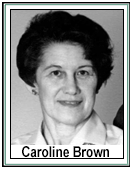 Wilma (Heiden) Bicking - Caroline Brown might have movies about them. Bill Brown’s
wife. She was Caroline Laas. Wilma (Heiden) Bicking - Caroline Brown might have movies about them. Bill Brown’s
wife. She was Caroline Laas.
Helma (Heiden) Nickel - The
Laas’ were cousins from Toledo. She is the same age that
I am.
Wilma (Heiden) Bicking - They had a movie camera and always took movies at the
reunion. The one I remember best is the year after Mildred died,
they brought the movies of Mildred walking around with Sally.
Helma (Heiden) Nickel - I don’t remember Grandpa and Grandma Heiden coming to the
reunions.
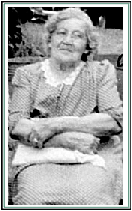 Helma (Heiden) Nickel & Wilma (Heiden) Bicking - The people from Toledo got the reunions started. The
Burmeisters and the
Laas’. Helma (Heiden) Nickel & Wilma (Heiden) Bicking - The people from Toledo got the reunions started. The
Burmeisters and the
Laas’.
Helma (Heiden) Nickel - I asked Caroline how we are related to them. The only thing
she could figure out was that maybe our grandparents were cousins or
something.
Norma "Jeanie" Heiden - How come Berlins came?
Helma (Heiden) Nickel - She was married to a
Laas.
Wilma (Heiden) Bicking - Aunt Rika (Laas) Burmeister
(right) stood up for me.
Helma (Heiden) Nickel - She was a
Laas.
She was a sister to
John,
Herman and
Louis Laas. |
 |
 |
 |
 |
|
 This
was a carry over of a 19th century custom in rural America where
a newly married couple were given a mock serenade performed with
pots, pans and homemade instruments. This
was a carry over of a 19th century custom in rural America where
a newly married couple were given a mock serenade performed with
pots, pans and homemade instruments. |
|
|
Mary Lou (Heiden) Opfermann - I remember Helma and Herb’s shivery. That was impressive
to me.
Norma "Jeanie" Heiden - They went to Indiana to get married but when they came home,
a bunch of relatives and neighbors said, “We’re coming tonight so
have some beer ready.”
Helma (Heiden) Nickel - I still have the receipt from Jim Malone’s in Ida where Herb
went and got the beer. It was a dollar something a case. He got beer
and candy and pop for the kids.
Mary Lou (Heiden) Opfermann - Remember they had the old metal wash tubs that they were
banging on to make noise?
Wilma (Heiden) Bicking - You always had to be careful because they would threatened
to take the bride “for a ride” in the truck.
Norma "Jeanie" Heiden - Did they take you for a ride?
Helma (Heiden) Nickel - No they didn’t!
Norma "Jeanie" Heiden - You should have heard the noise.
John Eipperle put something
on his exhaust pipe that made the pipes “whistle” real loud. I
remember everyone in the house just holding their ears. They made so
much noise!
Mary Lou (Heiden) Opfermann - What year did you get married, Helma?
Helma (Heiden) Nickel - 1938
Mary Lou (Heiden) Opfermann - So, I would have been 9 years old but I can remember it
very well.
Pat (Bicking) Klass - The only place I ever saw a shivery was on The Waltons on T.V.
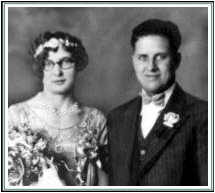 Helma (Heiden) Nickel - They had one for
Mildred and John Eipperle too. That was ten
years before Herb and I got married though. Helma (Heiden) Nickel - They had one for
Mildred and John Eipperle too. That was ten
years before Herb and I got married though.
Norma "Jeanie" Heiden - They had those big tubs of beer and everybody came and
drank. They just had to have a party.
Word must have passed around the neighborhood and they just showed
up at a certain time. You had to have some food and drink ready.
Wilma (Heiden) Bicking - Did you know they were coming?
Helma (Heiden) Nickel - Yes. It was on the very first night back from being married.
We got back from
Hilda’s on Sunday and the shivery was on Monday
night.
All the relatives from Toledo were invited too. The house was
full. The yard was full. Norma "Jeanie" Heiden - People would make all kinds of noise banging on pots and
tubs.
Helma (Heiden) Nickel - Yes, and then the newlyweds would have to show themselves on
the porch.
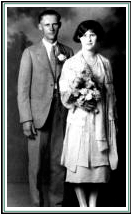 Wilma (Heiden) Bicking - Guess you’d say we were kind of a party family. Wilma (Heiden) Bicking - Guess you’d say we were kind of a party family.
Pat (Bicking) Klass - At the reunions, I remember having those big horse troughs and
everyone would be in there fishing around for beer and pop in the
icy water.
Helma (Heiden) Nickel - At
Lester and Lila’s shivery, I remember them passing out
drinks and fresh fried cakes.
Norma "Jeanie" Heiden - Did
Lee and Lou have one?
Mary Lou (Heiden) Opfermann - I don’t remember, I wasn’t born yet! |
 |
 |
 |
Ralph Heiden - We
were talking earlier about the
Laas’ and Mary Lou has a
picture of some of them. Mary and
William Carl Heiden,
Aunt
Libbie Laas,
Aunt Emma
Laas formerly
Ullrich.
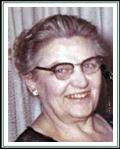 Mary Lou (Heiden) Opfermann - Who are they? I don’t understand what relation they are
to us. Mary Lou (Heiden) Opfermann - Who are they? I don’t understand what relation they are
to us.
Norma "Jeanie" Heiden - They’re Pa’s cousins. That’s where
Alice (Laas) Berlin
(left) comes in.
Wilma (Heiden) Bicking - We always called them “Aunt
and Uncle.” Uncle Will
Laas was
from Texas. He was the “rich” one in the family. Who were the
Paulsens?
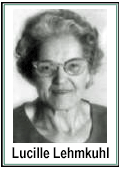 Helma (Heiden) Nickel
- They were relations to Aunt Emma
Laas, I think. They were
some of the leaders when it came to starting the annual Heiden
reunion. Helma (Heiden) Nickel
- They were relations to Aunt Emma
Laas, I think. They were
some of the leaders when it came to starting the annual Heiden
reunion.
Mildred (Roggerman) Heiden - Lucille [Lehmkuhl] was a
Burmeister wasn’t she?
Helma (Heiden) Nickel - Louie and Aunt Rikie
Burmeister,
she was a Laas too. Lucille
had a sister, Mildred, who died of infantile paralysis. No, Lucille
was the one on crutches.
Wilma (Heiden) Bicking - Her sister, Florence
Burmeister, was the Paulsen. She
married a Paulsen. They used to come out from Toledo and they were
the ones who made the lemonade at the reunion.
|
 |
 |
 |
|
Ralph Heiden - One of the things a lot of people have mentioned is
Grandma’s cooking.
Helma (Heiden) Nickel - At least three times a week, she would bake bread.
Mary Lou (Heiden) Opfermann - She made the best sugar cookies!
 Mildred (Roggerman) Heiden - One time Art went over to their house and he came back and
said, “Ma’s making bread today. Don’t you think you should go and
help her?” I knew that he just wanted me to go and learn how to make bread like
she did. So, I said, “With all the experience she’s had, I don’t
think she needs my help!” Mildred (Roggerman) Heiden - One time Art went over to their house and he came back and
said, “Ma’s making bread today. Don’t you think you should go and
help her?” I knew that he just wanted me to go and learn how to make bread like
she did. So, I said, “With all the experience she’s had, I don’t
think she needs my help!” Wilma (Heiden) Bicking - She would make donuts too. The ones I liked best where when
she would make those long stick, long-johns and frost them.
Norma "Jeanie" Heiden - A lot of the relatives from
Toledo like the
Laas ’ and
Berlin’s would come on Sunday night just in time for dinner.
Mary Lou (Heiden) Opfermann - Always!
Norma "Jeanie" Heiden - They would come about 4 or 5 p.m. Ma would send us down in
the basement to get some more jars of preserved beef. Boy, that made
the best gravy! Or, she would make some pork sausages and fried
potatoes.
Ralph Heiden - You wonder now about how people make such a big deal out of
eating a pat of butter or having an occasional egg for breakfast
when back then, they ate the fattest meats and sausages.
Norma "Jeanie" Heiden - Ma would save the grease from bacon. Then when you fried
potatoes you would use that grease.
Wilma (Heiden) Bicking - Sometimes they would put that old lard directly onto bread
and eat it like a sandwich! And we worry about eating a little bit
of butter.
Mildred (Roggerman) Heiden - Art always talked about taking lard sandwiches to school.
Wilma (Heiden) Bicking - I can remember coming home from school and taking a piece of
fresh bread and putting the bacon grease on it for a snack. Pa used to eat mettwurst and eggs and spicanse for breakfast.
Mary Lou (Heiden) Opfermann - I can remember him cutting the fat off pork and eating
it. It would make us kids almost sick. |
 |
 |
 |
|
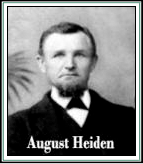 Ralph Heiden - Do you recall any stories about your grandfather,
August Heiden ? Ralph Heiden - Do you recall any stories about your grandfather,
August Heiden ?
William Frank Heiden - About all I remember of him is going over to their place
on South Custer and he would be sitting in that old high back chair.
Marie (Heiden) Tommelein - And he had that earphone in his ear so he could hear.
William Frank Heiden - Other than that, I really don’t remember anything else
about him.
Ralph Heiden - We always heard a story about when they came over that a
little daughter died on the ship. Well,
Myrna (Drake) Bishop who is
Bertha (Heiden) Drake’s daughter and granddaughter of
Herman Heiden, was told that
the little girl lived through the voyage but died here and is buried
in Monroe. Mary Lou did some detective work and found that she was
buried in Zion Lutheran Cemetery in Monroe on June 16, 1873 only 12
days after they landed in New York.
Marie (Heiden) Tommelein - And there was a gravestone for her?
Ralph Heiden - Yes.
Mildred (Roggerman) Heiden - There was a
Laas baby buried next to her too.
Ralph Heiden - That’s another question. I keep hearing about the
Laas’ but
nobody really knows what relation they were to the Heidens.
Marie (Heiden) Tommelein - They were always there at the reunions.
William Frank Heiden - I think it was Bill
Laas from Texas. They came every year.
Marie (Heiden) Tommelein - There
was Miss Libbie Laas. I don’t think she ever got
married but I can remember her being there.
William Frank Heiden - Maybe they came over from Germany together or something.
There had to be some connection. They were always big at the
reunions along with the
Burmeisters.
Mary Lou (Heiden) Opfermann - Since
Meta was buried next to a Laas, it makes you wonder
if they had some early connection.
Marie (Heiden) Tommelein - Did the Laas’ come over on the boat with August?
Ralph Heiden - No. The one (Laas child) that is buried at Zion Cemetery was buried in
1869, four years earlier. So, they were already here.
Here’s an idea that I’m starting to wonder about. August, my great
grandfather, had a half sister. In the 1920's, her granddaughter
sent a series of letters to August’s wife, Rika.
I finally found an elderly German lady who could read the old script
writing and is translating those letters word for word. I have about
5 or 6 of them done now.
In one of the letters, they say that they were corresponding with
Elizabeth Laas. So, perhaps, the Laas’ are descendants of
August Heiden's half-sister. They would be a distant relative but still
related. I don’t have any evidence to draw that conclusion but it
might be that way.
Mary Lou (Heiden) Opfermann - That could be the connection.
|
 |
 |
 |
|
Ralph Heiden - The letters are rather sad overall. They were having some
very tough times in Germany then and they were always asking their
Aunt Rika, my great grandmother, for money.
Mildred (Roggerman) Heiden - In one of them, they ask for some money for a house and
some land. Then, later they say they bought the house but needed
more money for the land.
Marie (Heiden) Tommelein - Did they ever help them?
Ralph Heiden - Yes, they sent money when they could and they were always
very appreciative of it and told what the money would buy.
Brick Tommelein - My dad said that at that time, everyone over in Europe
called America “the land of opportunity.”
Ralph Heiden - A lot of people here were helping their relatives then too.
In one of the letters, they ask Rika to send her letters registered
because people were stealing things from mail from America because
those envelopes were likely to have money in them.
Helen (Henning) Heiden - Now are these letters all from Mecklenburg?
Ralph Heiden - Yes. They are from the area called Mecklenburg and the port
city of Rostock. The little villages where our ancestors came from
are the size of
Grape and Maybee and they are about 50 miles from
Rostock.
Helen (Henning) Heiden - From the Hennings, I heard them say that the people were
like slaves back then in Germany. They worked for all these big rich
people. They provided pay for them and took care of them but they
couldn’t get ahead. They didn’t want them to get married because
there were already too many of them to take care of. That is where
the Hennings came from too.
Mildred (Roggerman) Heiden - Didn’t you say that our name should be something other
than Heiden?
Ralph Heiden - Yes, my great grandmother,
Maria Heiden, did not marry the
father of August. So, he took her name rather than his father’s
which was Kannsehr
or Canseyer.
Helen (Henning) Heiden - That’s the same way with my grandpa Henning. Grandma wasn’t
married when she had those two kids.
Ralph Heiden - That was a real common occurrence back then.
Mildred (Roggerman) Heiden - They wouldn’t let you get married unless you could support
yourself.
Ralph Heiden - They technically weren’t slaves but there was nowhere else
for them to go except to another big estate to work and they were
full too. Also, the landowner had the responsibility to take care of
the people on his land so he was stuck too.
That is why they pushed a lot of them to leave and go to America.
Also, the illegitimacy rate went way up because even though they
weren’t legally allowed to marry, people continued to form couples
and do what they needed to do.
Helen (Henning) Heiden - You wonder why the Heidens would come here but they said on
the Henning side that they would send money back to Germany to help
others come here.
Ralph Heiden - But with the Heidens, we don’t know who was here to pave the
way for them. Maybe with this Laas connection, there might be
something to go on.
The
Rambows came a year later. They came here in 1874 and I don’t
know if they came from the same part of Germany as the Heidens. I
haven’t looked into that yet.
I think about the only way we are going to learn why the Heidens
came here is if we stumble onto somebody in one of the other
branches that has an old box of papers up in the attic that someone
gave them long ago. Otherwise, the reason may be lost to history.
[Note: According to
Karen (Berns) Wheaton, the Rambows did come from the
same area in Germany.] |
 |
|
|
|
|



